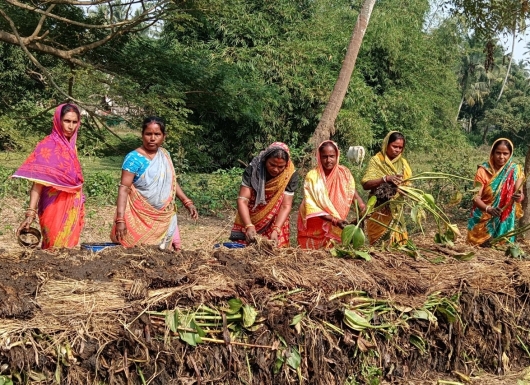Submitter: (ICRISAT)
Zero tillage is a conservation tillage practice where seeds are directly sown into untilled soil. Zero tillage helps to improve soil moisture retention and water infiltration, while reducing the risk of erosion. Most of the farmers in drylands keep the land fallow during post-rainy season due to issues viz., non-availability of moisture during post-rainy season, reduced working ability in the field due to soil hardness and lack of drought-tolerant crop varieties and knowledge on machineries available for sowing after the harvest of paddy. These issues could be addressed through zero till sowing practice, which enables farmers to bring fallow areas under cultivation.

The multi-crop planter developed for conservation agriculture allows direct sowing of seeds without the need for conventional land preparation, thereby conserving soil moisture and reducing the risk of moisture loss. This is particularly beneficial during the post-rainy season, as it enables efficient use of residual soil moisture for better crop establishment. Rabi crops (post monsoon crop) can be sown immediately after the harvest of paddy, ensuring timely operations and improved productivity. The technology also results in substantial savings in labor, time, and energy, minimizing land preparation costs. Farmers can gain an additional yield of 5–6 quintals per hectare, with net monetary benefits ranging from ₹12,000 to ₹15,000 per hectare, making it a valuable tool for sustainable and profitable agriculture.
The zero-tillage practice is suitable for both rainfed and irrigated ecologies for optimizing use of residual soil moisture and improving soil health. Suitable for a wide range of crops, intensive cropping systems (where rice-wheat is prevalent) and regions where soil health and productivity are priorities.
Large area under different projects in Odisha, Uttar Pradesh, Andhra Pradesh and Telangana brought under cultivation using zero-tillage practice and shows potential at landscape scale. Under the ICRISAT-OLM project, the zero-tillage technology was demonstrated in Odisha with different crops viz., chickpea, maize, field pea, sunflower, green gram and black gram were sown using zero-till multi crop planter. More than 1000 acres of land in Koraput, Nabarangpur, Gajapati and Rayagada brought under cultivation during post-rainy season, which otherwise used to be fallow due to lack of water availability.
Availability of suitable zero till machineries through different schemes is crucial for large scale adoption of the technologies. Capacity building cum Training Programs on zero-tillage machineries and its operations is important. The policy support is needed in designing recommendations for adoption and incentivization of zero till machineries through established custom hiring centers.
Dr Gajanan Sawargaonkar, Phone:- 7702540820 Email- Gajanan.Sawargaonkar@icrisat.org
Dr. S K Swain, Phone No: 7978000363 Email- swainsangram@yahoo.co.in
Dr Prasad Kamdi: Phone-9701060490 Email. Prasad.Kamdi@icrisat.org
Mr. Yogesh Singh, Phone No: 8861279410 Email- Yogesh.Kumar@icrisat.org